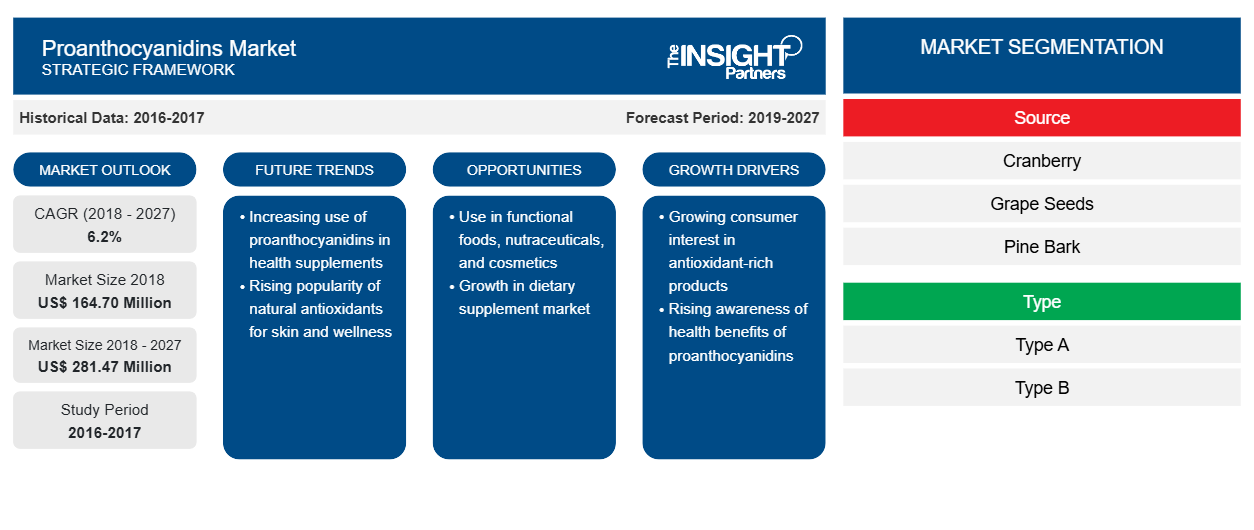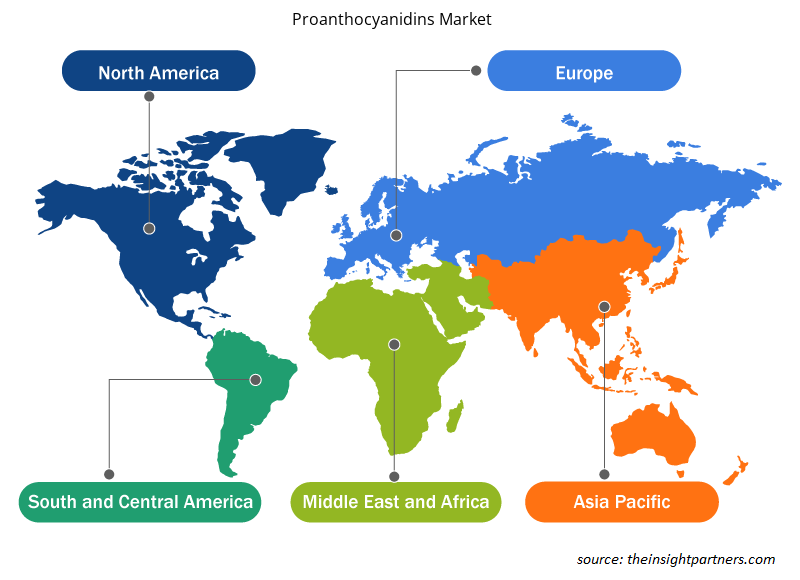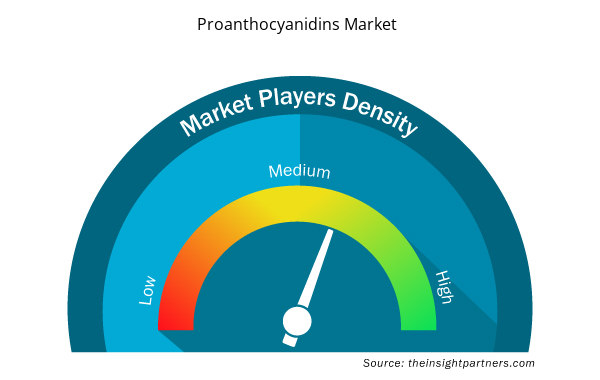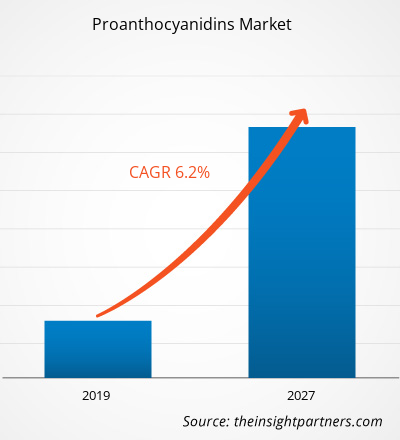[Research Report] The proanthocyanidins market was valued at US$ 164.70 million in 2018 and is projected to reach US$ 281.47 million by 2027, growing at a CAGR of 6.2% during the forecast period from 2019 to 2027.
Proanthocyanidins ((PAC) are a class of flavonoids which are known for its nutritional value and therapeutic health benefits. The demand for proanthocyanidin-rich products is increasing with the rapid evolution of the healthcare and food and beverage industry. Various studies have been conducted related to proanthocyanidins which represents their health-promoting effects, and their application in the food and pharmaceutical industry.
Asia Pacific is estimated to register the fastest CAGR in the market over the forecast period. The rapid growth of this region is primarily attributed to the rising awareness related to health benefits and rich nutritional profile offered by the products prepared from proanthocyanidins. Due to the increase rate of lifestyle-related diseases, people are opting for a healthier lifestyle and food. Proanthocyanidins reduce the oxidative damage caused by free radicals in the human body. Further, it also helps in preventing heart-related diseases, and several studies have shown that proanthocyanidins reduce blood pressure and improve fat metabolism. Moreover, some studies also claim proanthocyanidins to have antitumor and anti-cancer activities. These factors are anticipated to fuel the growth of the proanthocyanidins market in the Asia Pacific region over the forecast period. Further, the growing demand for proanthocyanidin in organic and natural beauty products is projected to drive the market growth in the Asia Pacific region.
Customize This Report To Suit Your Requirement
You will get customization on any report - free of charge - including parts of this report, or country-level analysis, Excel Data pack, as well as avail great offers and discounts for start-ups & universities
Proanthocyanidins Market: Strategic Insights

- Get Top Key Market Trends of this report.This FREE sample will include data analysis, ranging from market trends to estimates and forecasts.
Customize This Report To Suit Your Requirement
You will get customization on any report - free of charge - including parts of this report, or country-level analysis, Excel Data pack, as well as avail great offers and discounts for start-ups & universities
Proanthocyanidins Market: Strategic Insights

- Get Top Key Market Trends of this report.This FREE sample will include data analysis, ranging from market trends to estimates and forecasts.
Market Insights
Rising use of proanthocyanidins in cosmetic applications
Natural ingredients are becoming more prevalent in the formulations for cosmetic and skin care purposes due to growing consumer concerns associated with synthetic ingredients and chemical substances. The use of plant extracts has been extended to skin care and personal care applications owing to its antioxidant and antimicrobial activities and tyrosinase inhibition effect. Proanthocyanidins are considered as a type of powerful free radical scavenger and antioxidant which are extracted from plant extracts such as grape seed extract, cranberry extract, pine bark extract and others. The antioxidant and scavenging properties of proanthocyanidins are increasingly identified to produce several products in personal care sector. The polymers are potentially used to improve chloasma in a short period of administration. For instance, the grape seed hydroethanolic extract is a rich source of polyphenols including proanthocyanidin. The grape seed extract is therefore, used to prepare grape seed oil, serum and other cosmetic products. Grape seed oil has high amount of tannins and oligomeric proanthocyanosides and possesses high stability and resistance to oxidation reaction. Further, the presence of proanthocyanidins provide the skin with strong antioxidant characteristics which helps to neutralize free-radicals present in the environment. Also, proanthocyanosides is also known to possess skin-soothing and healing properties. In addition, proanthocyanidins are being increasingly used in preparation of cosmetics, such as hand cream and sunscreen cream. Therefore, it is evident that proanthocyanidins are widely useful in the production of several cosmetic products. The growing focus towards research and development followed by the advancement in technology along and growth of cosmetic and skincare market, the demand for proanthocyanidins is expected to rise in the global scenario.
Source Insights
The proanthocyanidins market based on source has been segmented into cranberry, grape seeds, pine bark and others. The cranberry is the fastest growing segment in the global proanthocyanidins market. Cranberry contains proanthocyanidins (PACs) which have been identified as one of the phytochemicals responsible for many of the health benefits. Cranberries contain unique A-type PACs, that exhibit ex vivo bacterial anti-adhesion activity. It helps prevent to E. coli, which is the cause of about 85% of Urinary tract infections (UTIs) and 90% of cases of acute pyelonephritis. The PACs contained in cranberries may also benefit oral health. T e presence of PACs along with other vitamins and antioxidants has increased the use of cranberries and its extracts in pharmaceuticals and dietary supplements. With the rise in the aging population, consumers are becoming more conscious and aware of various diseases that can be prevented by consuming natural foods and supplements containing proanthocyanidins. These concerns have driven the growth of the segment in the proanthocyanidins market..
Type Insights
The proanthocyanidins market based on type is segmented into type A and type B. Type A segment is the fastest growing segment in the global proanthocyanidins market. Type A proanthocyanidins are a type of proanthocyanidins, which are a class of flavonoids. Although various food plants such as red grapes, black grapes, grape seeds, red wine, bilberries, strawberries, blueberries, red cabbage, apple peel, and pine bark contain high amounts of proanthocyanidins, only a few food plants such as cranberries, plums, avocados, peanuts or cinnamon, contain type A proanthocyanidins, Cranberries are considered as a major source of type A proanthocyanidins. Cranberry proanthocyanidins are composed of type A linkages and have been closely linked with preventing adhesion of P-fimbriated uropathogenic Escherichia coli to uroepithelial cells. Type A proanthocyanidins found in cranberries have healthy aging properties. This has propelled the demand for type A proanthocyanidins in the cosmetic application. The type A proanthocyanidins in cranberry are unique because they are the only proanthocyanidins that have antibacterial activity. The anti-adhesion property of type A proanthocyanidins is the basis of the extraordinary ability of cranberries to improve urinary tract health.
Application Insights
The proanthocyanidins market based on application is segmented into pharmaceuticals and dietary supplements, foods and beverages, and personal care and cosmetics. The personal care and cosmetics segment is the fastest growing segment in the global proanthocyanidins market. Proanthocyanidins is gaining traction from personal care and cosmetics products manufacturers due to its antioxidants, anti-inflammatory, moisturizing, and hydration properties. It has ability to bond with collagen which makes it effective in promoting youthful skin, cell health, elasticity, and flexibility. Proanthocyanidins helps to firm up the facial skin and also helps to reduce wrinkles and blemishes for a younger look. It also reduces the cosmetical damage of UV exposure, such as increased pigmentation, thus lightening the skin. Thus it is used in various personal care and cosmetics products such as anti-aging creams, sunscreens, facial serum, cleaners, lotions etc. Proanthocyanidins oil is also used as an ingredient in various lip balms and lip care products, as it can moisturize the sensitive skin of the lips and helps in retaining its softness. Proanthocyanidins may also help in improving the complexion by averting blemishes. Proanthocyanidins are also used in the face creams to avoid acne breakouts due to its anti-bacterial properties. Proanthocyanidins also performs on large open pores of the skin and tightens the skin. It has skin health-boosting collagen protein, which helps to reduce pores. All these therapeutic properties have raised the utilization of proanthocyanidins in personal care and cosmetic products which is driving the market growth.
Market initiative and mergers and acquisitions are commonly adopted by companies to expand their footprint worldwide, which is further impacting the size of the market. The players present in the proanthocyanidins market adopt the strategy of market initiative and mergers and acquisitionsto enlarge the customer base and to gain significant market share across the world, which also permits the players to maintain their brand name globally.
Proanthocyanidins Market Regional Insights
The regional trends and factors influencing the Proanthocyanidins Market throughout the forecast period have been thoroughly explained by the analysts at Insight Partners. This section also discusses Proanthocyanidins Market segments and geography across North America, Europe, Asia Pacific, Middle East and Africa, and South and Central America.

- Get the Regional Specific Data for Proanthocyanidins Market
Proanthocyanidins Market Report Scope
| Report Attribute | Details |
|---|---|
| Market size in 2018 | US$ 164.70 Million |
| Market Size by 2027 | US$ 281.47 Million |
| Global CAGR (2018 - 2027) | 6.2% |
| Historical Data | 2016-2017 |
| Forecast period | 2019-2027 |
| Segments Covered |
By Source
|
| Regions and Countries Covered | North America
|
| Market leaders and key company profiles |
Proanthocyanidins Market Players Density: Understanding Its Impact on Business Dynamics
The Proanthocyanidins Market market is growing rapidly, driven by increasing end-user demand due to factors such as evolving consumer preferences, technological advancements, and greater awareness of the product's benefits. As demand rises, businesses are expanding their offerings, innovating to meet consumer needs, and capitalizing on emerging trends, which further fuels market growth.
Market players density refers to the distribution of firms or companies operating within a particular market or industry. It indicates how many competitors (market players) are present in a given market space relative to its size or total market value.
Major Companies operating in the Proanthocyanidins Market are:
- NOW Foods
- Fruit d'Or
- Artemis International
- Beijing Gingko Group
- Eevia Health Oy
Disclaimer: The companies listed above are not ranked in any particular order.

- Get the Proanthocyanidins Market top key players overview
Report Spotlights
- Progressive industry trends in the global proanthocyanidins market help players develop effective long-term strategies
- Business growth strategies adopted by developed and developing markets
- Quantitative analysis of the global proanthocyanidins market from 2017 to 2027
- Estimation of global proanthocyanidins demand across various industries
- PEST analysis to illustrate the efficacy of buyers and suppliers operating in the industry to predict market growth
- Recent developments to understand the competitive market scenario and global proanthocyanidins demand
- Market trends and outlook coupled with factors driving and restraining the growth of the global proanthocyanidins market
- Decision-making process by understanding strategies that underpin commercial interest with regard to global proanthocyanidins market growth
- Global proanthocyanidins market size at various nodes of market
- Detailed overview and segmentation of the global proanthocyanidins market, as well as its dynamics in the industry
- Global proanthocyanidins market size in various regions with promising growth opportunities
Global Proanthocyanidins Market – By Source
- Cranberry
- Grape Seeds
- Pine Bark
- Others
Global Proanthocyanidins Market, by Type
- Type A
- Type B
Global Proanthocyanidins Market, by Application
- Pharmaceuticals and Dietary Supplements
- Foods and Beverages
- Personal Care and Cosmetics
Company Profiles
- NOW Foods
- Fruit d'Or
- Artemis International
- Beijing Gingko Group
- Eevia Health Oy
- Indena S.p.A.
- Nexira
- Natac Group
- Givaudan S.A.
- Yuensun Biological Technology Co., Ltd
- Historical Analysis (2 Years), Base Year, Forecast (7 Years) with CAGR
- PEST and SWOT Analysis
- Market Size Value / Volume - Global, Regional, Country
- Industry and Competitive Landscape
- Excel Dataset



Report Coverage
Revenue forecast, Company Analysis, Industry landscape, Growth factors, and Trends

Segment Covered
Source ; Type ; Application , and Geography

Regional Scope
North America, Europe, Asia Pacific, Middle East & Africa, South & Central America

Country Scope
Argentina, Australia, Brazil, Canada, China, France, Germany, India, Italy, Japan, Mexico, Russian Federation, Saudi Arabia, South Africa, South Korea, United Arab Emirates, United Kingdom, United States

 Get Free Sample For
Get Free Sample For